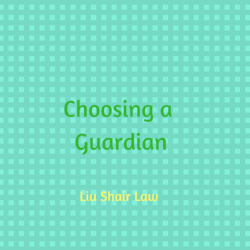Choosing a Guardian
Many of our clients are parents with minor children. The first thing many are concerned with when approaching Estate Planning is, who would take care of my children if I'm not around?
If you have not set up an Estate Plan that nominates guardians and you have passed away, then the court has to decide who the appropriate guardian would be, without knowing your preference or guidance.
It is important to have your Estate Plan customized and completed for you for a variety of reasons, and one is to make sure your children are cared for by those you trust and chose to be their guardians. The guardian the someone who takes physical custody of your children until they are legal adults at 18 years old.
There are several criteria to consider when making this important choice.
- Your and your children's relationship with the person
The person you choose to be the guardian of your children should be someone that you and your children trust. The guardian is the person who takes physical custody of your children and acts as the parental role to make decisions on their well being, sign off for any school or medical decisions, as well as myriad other things. In the event a guardian is necessary, your children may already be emotionally overwhelmed by the loss. You would not then want them to be placed with someone they don't know or worse, be placed in the foster care system for any amount of time.
- Where this person lives
Because the guardian takes on the parental role, the children would be living with them. This means there are two options: 1) the children move to where the guardian resides or 2) the guardian is able to move to where the children reside. Depending on your children's ages, this is a large consideration. If they are younger, they may be more able to adapt to a different geographic location. If they are older, they may feel very set in their routine, established at their school, and anxious to leave the place where they grew up. It is by no means illegal to nominate a guardian who lives far away or even abroad, but it is a consideration to keep in mind. Also, if all the permanent guardian options you choose are not local, you can opt to nominate an interim guardian. This is someone who takes care of your children until your permanent guardian is able to come and take custody of them.
- What their family situation is
Your chosen guardian could very well be a family member or friend who has their own family. First, you want to have a discussion with them to make sure they would be willing and able to take care of your children. Be sure to have this conversation with them before nominating in your Estate Plan. Second, you should consider how adding your children to their family would affect the family dynamics. For instance, if a sister loves your children, but you know she really does not want the pressure of having a child, she may not be the best fit. If your best friend has two children who get along well with your children and your best friend is willing and able to manage a larger family, this may be a better fit.
- What their values are
Everyone is different and approaches parenting with a different philosophy. This does not mean one pedagogy is right or wrong, but it can significantly impact your children. Consider how your guardian approaches issues like education, extracurricular activities, religion, and other topics that affect your family. You can even leave guidance to your nominees through your Estate Plan by writing "Personal Requests" so they are aware of what you value and what your children prioritize.
---
Many people, even lawyers, feel paralyzed by deciding who to nominate as the guardian. It is important to know that you may be able to change your guardian choice over time by updating your Estate Plan with an attorney. You should be considering who would be the best choice for your family situation should something happen in the next three years. I advise my clients to review their Estate Plan every three years to make sure everything still fits.
Here are a few extra things to note about making guardianship nominations.
-You can nominate several guardians in an order of priority. This way, if something has happened to one of your nominees or they are no longer able to act as the guardian, you have other options available. Still, you should make sure whoever you have nominated is someone you would feel confident in taking on the role.
-If you are hoping to nominate two people to be co-guardians, please make sure to discuss this with an attorney to understand what this would mean in a practical sense.
-If there is someone in the family who you would be highly uncomfortable taking care of the children, you can also "anti-nominate" someone so that your wishes are clear.
-You can leave directions or "personal requests" to your guardian nominees so that they are aware of your preferences regarding things like school choices, religious practices, maintaining different relationships, and any other extracurricular or travel wishes. These wouldn't be legally binding, but would give the guardian background as to your family dynamics and child rearing philosophies.
Tip: It's a good idea to have your guardian nominee listed on the list of individuals authorized to pick your children up from school. This way, there are not complications if they have to come get your children.
We hope this post was helpful to you. We generally don't expect anything to our clients anytime soon, but having a customized and comprehensive Estate Plan in place is quite important to provide sense of relief and make sure to take care of the unexpected.

